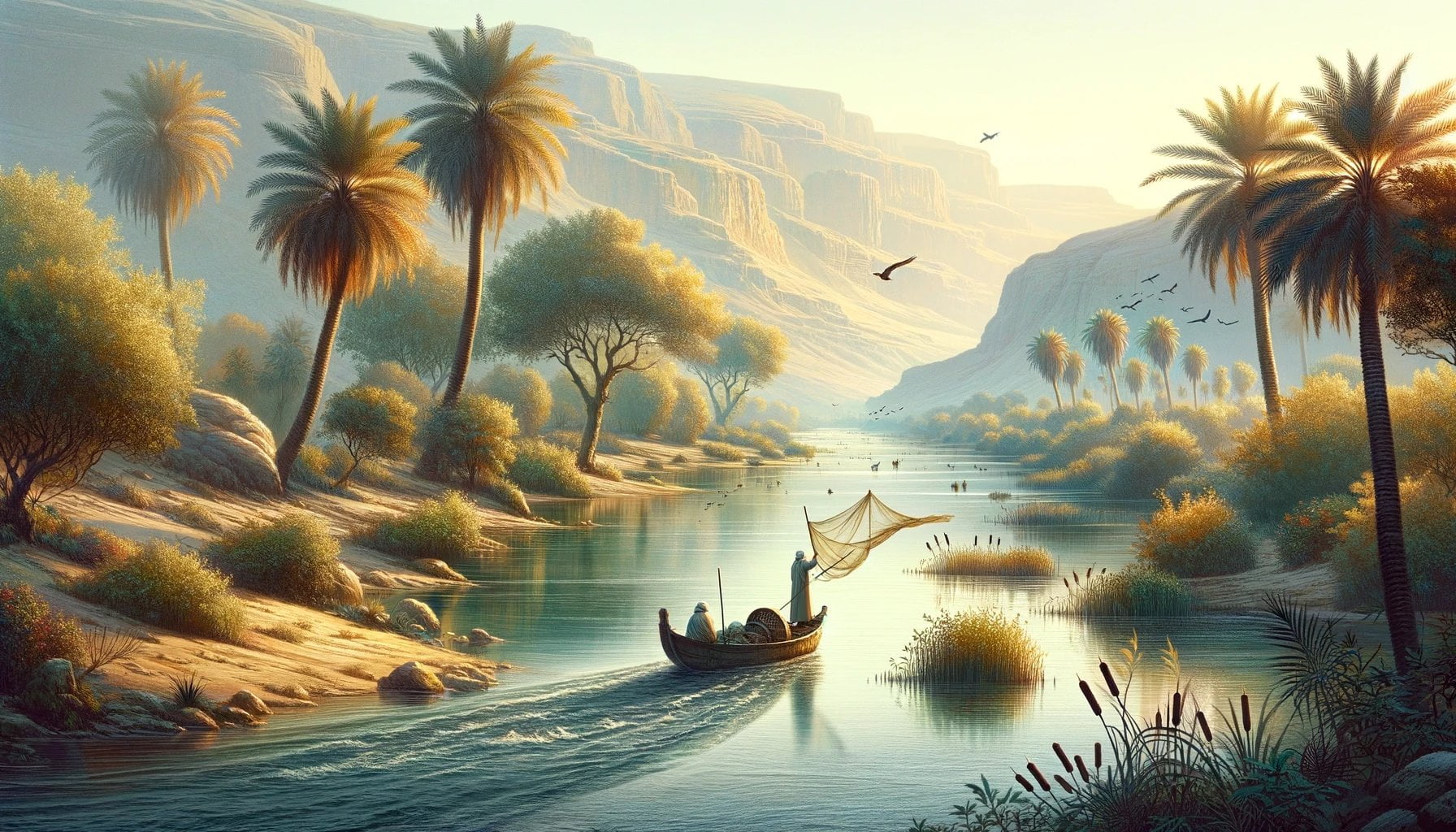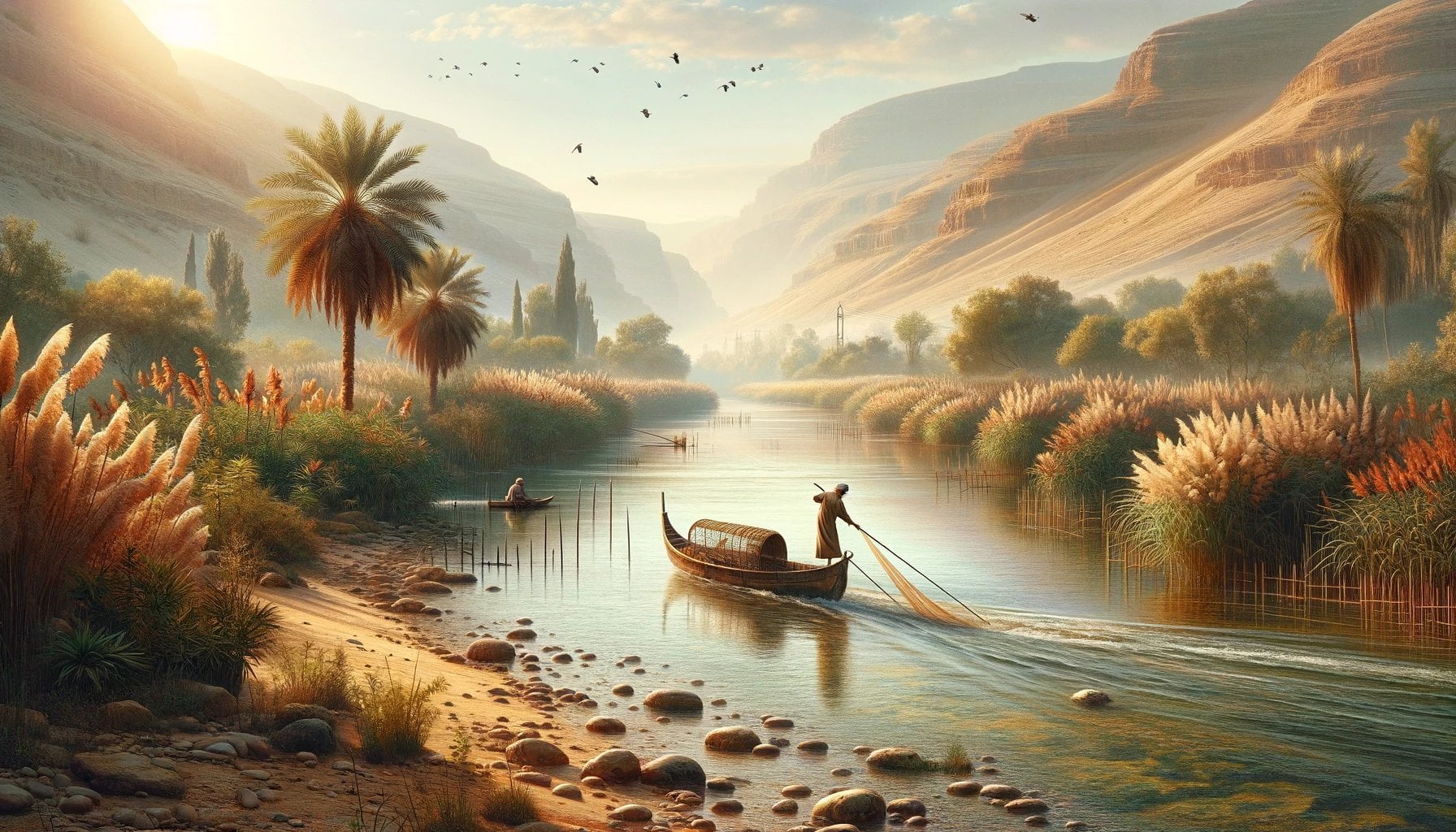The River Jordan, a ribbon of life winding through a land steeped in history, beckons us to explore its mysteries. From its origins in the heights of the Anti-Lebanon Mountains to its final surrender in the enigmatic Dead Sea, the Jordan has witnessed the rise and fall of civilizations, nurtured diverse ecosystems, and served as a crucible for spiritual growth. Join us as we delve into the captivating narrative of this iconic river, uncovering its geological marvels, the vibrant tapestry of life it supports, and the profound influence it has wielded on humanity.

Facts About the River Jordan
The River Jordan is more than just a geographical feature; it’s a place where ancient narratives intertwine with the realities of the present day, where faith finds its reflection in the natural world. Let’s uncover some intriguing truths about this legendary waterway:
- A River of Deep Spiritual Significance: The Jordan River holds profound religious significance, particularly for Christians who revere it as the site of Jesus’s baptism.
- Carving a Path Through Nations: Serving as a natural border, the Jordan River delineates Jordan on its eastern bank from Israel and Palestine on its western edge. This geographical divide has played a pivotal role in shaping the region’s politics for centuries.
- From Rushing Rapids to Tranquil Waters: The Jordan displays remarkable diversity along its course. While its northern reaches are characterized by fast-flowing, shallow waters, it deepens and slows as it flows southward. The river carries a significant amount of silt, contributing to the highly saline soil along its banks.
- Hidden Gems: Therapeutic Springs: Along the Jordan River’s course, natural thermal springs emerge, offering mineral-rich waters believed to possess healing properties. People have sought solace and rejuvenation in these springs for centuries.
- Lifeblood of the Region: The Jordan River is not merely a scenic wonder; it’s a lifeline for the surrounding lands. Its waters are essential for agriculture, irrigation, and sustaining the diverse ecosystems it traverses.
Where Does the River Jordan Begin and End? Unveiling its Course and Tributaries
The Jordan River’s journey begins with the confluence of three rivers—the Dan, Baniyas, and Hasbani—in the Anti-Lebanon Mountains. From this mountainous cradle, it embarks on a remarkable journey southward to the Dead Sea.
- Three Rivers Converge: The Jordan’s headwaters are formed by the union of the Dan, Baniyas, and Hasbani rivers, which flow down from Mount Hermon, a majestic peak straddling the border of Lebanon and Syria.
- A Winding Path Through Varied Landscapes: The Jordan descends from its mountainous origins into the placid Sea of Galilee, a lake teeming with life. After this brief respite, the river continues its southward flow, meandering between Israel, the West Bank, and Jordan, before making its dramatic final descent into the Dead Sea—the saltiest body of water on Earth. Here, the river’s freshwater evaporates, leaving behind a landscape of stark beauty.
- Tributaries: Nourishing the Flow: Numerous tributaries, each with its own unique story, join the Jordan along its 223-mile course. These smaller rivers and streams, including the Yarmouk, Zarqa, and Jabbok, are essential in replenishing the Jordan’s flow.
- Did you know that there are 25 fascinating facts about the Pentagon? Discover them all here!
- Get ready to be amazed by the cool facts about the Dominican Republic! Click here to uncover these incredible secrets.
- Dive into the intriguing world of the Suez Canal and explore some mind-blowing facts about it here.
- Have you ever wondered about the interesting facts surrounding Bora Bora? Unearth these hidden gems here!
- Journey back in time and explore fascinating facts about the Temple of Artemis by clicking here.
- Get ready to be amazed by the incredible facts about the New River Gorge Bridge! Discover them all here.
- Learn 10 incredible facts about Key West that will leave you speechless! Click here to find out more.
- Discover 3 interesting facts about the Dominican Republic that will make you want to pack your bags and explore here!
- Brace yourself for some fun facts about Olympic National Park! Don’t miss out, click here to uncover them.
- Explore the mesmerizing North Central Plains of Texas with these fun facts! Learn more here.
The River Jordan’s Significance: From Ancient Civilizations to Modern Geopolitics
The River Jordan is more than a body of water; it’s a living testament to the ebb and flow of history in the Middle East. Empires have risen and fallen along its banks, their stories intertwined with its waters. Revered in the Bible and the Quran, the Jordan holds profound religious significance. It’s even believed to be the site of Jesus Christ’s baptism, making it a sacred place for billions worldwide.
The Jordan’s significance extends far beyond its historical and religious importance. Today, it forms a natural boundary between Jordan and Israel/Palestine, its presence felt in the intricate geopolitics of the region. It stands as a silent witness to the conflicts, fragile peace treaties, and ongoing negotiations that characterize this complex geopolitical landscape.
Despite its role in regional tensions, the Jordan River remains a vital lifeline. Millions depend on its waters for survival, agriculture, and industry. The Sea of Galilee, fed by the Jordan, teems with unique flora and fauna, highlighting the river’s ecological importance. Sadly, the Jordan faces numerous threats, including pollution, climate change, and water scarcity, underscoring the urgent need for sustainable practices to protect this precious resource.
For history enthusiasts, the Jordan Valley is an archaeological treasure trove, offering glimpses into the past through ruins dating back to the Bronze Age. Exploring ancient cities like Petra and Jerash provides a tangible connection to the rich tapestry of cultures that have called this region home.
Here’s the takeaway:
- The Jordan River has played a pivotal role in shaping borders and influencing international relations in the Middle East.
- Its historical and religious significance, particularly its association with Jesus Christ’s baptism, imbues it with timeless importance.
- The river serves as a vital source of water, supporting diverse ecosystems and sustaining local populations.
- The Jordan Valley is an archaeologist’s dream, offering a wealth of remnants from past civilizations.
- Protecting the Jordan River and ensuring its waters flow for future generations is a shared global responsibility.

The River Jordan’s Ecosystem: A Delicate Balance Under Threat
Despite its historical and cultural richness, the Jordan River’s ecosystem faces significant challenges. Human activities and climate change have pushed this once-thriving ecosystem to a precarious state. Over-extraction of water for domestic, agricultural, and industrial use in Israel, Jordan, and Syria has left the river severely depleted, jeopardizing its ability to support life.
Pollution from untreated sewage discharge further exacerbates the problem, contaminating the water and threatening the survival of fish and other aquatic species. Climate change adds another layer of stress, as rising temperatures and unpredictable rainfall patterns lead to reduced water flow, compounding the effects of over-extraction and pollution.
These pressures have led to a decline in the river’s biodiversity. Fish populations are dwindling, insect species are disappearing, and the once-vibrant tapestry of life along its banks is fading. The loss of riparian vegetation further degrades the ecosystem, reducing habitat for wildlife and increasing erosion.
As water levels recede and evaporation rates increase due to climate change, the remaining water in the Jordan becomes increasingly saline. This poses a serious threat to plants and animals, as high salt concentrations are toxic.
Despite the challenges, it’s not too late to restore the Jordan River to health. Collaborative efforts and sustainable practices offer hope for the future.
Here are some crucial steps toward restoration:
| Step | Description |
|---|---|
| Water Conservation | Implementing water-efficient technologies and practices in homes, agriculture, and industries to reduce overall consumption. |
| Wastewater Treatment | Investing in modern wastewater treatment plants and upgrading existing facilities to prevent raw sewage from entering the river. |
| Sustainable Farming | Adopting farming techniques such as drip irrigation that minimize water usage and reduce agricultural runoff. |
| Riparian Restoration | Planting trees and restoring vegetation along the riverbanks to create shade, reduce evaporation, and provide habitat. |
| Climate Change Adaptation | Implementing strategies to mitigate the impact of climate change, such as building dams and reservoirs to capture and store water during periods of heavy rainfall. |
The Jordan River has sustained life and nurtured civilizations for millennia. It’s time to act decisively and reverse the damage, ensuring that this vital waterway continues to flow for generations to come.
















